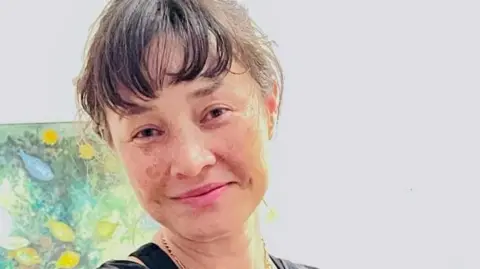 NSW Police
NSW PoliceFor many, Saturdays are something to look forward to – relaxed times, enjoyed with family and friends. But Elizabeth Young “dreads” them. It’s a weekly reminder of her daughter Jade’s violent murder at Westfield Bondi Junction.
“On a lovely autumn afternoon, to learn your daughter is dead, stabbed in broad daylight, killed amidst fellow unsuspecting shoppers… [when she] was living, breathing, just an hour ago… it’s the stuff of nightmares, of a parallel universe,” Elizabeth told an inquiry into the mass killing this week.
“The moment [the attacker] casually plunged that knife into Jade, our ordinary lives were shattered.”
Her pain was echoed by families of the other victims who gave emotional testimonies on the final day of a five-week coronial inquest into the fatal stabbings on 13 April last year.
The inquiry sought to understand how a 40-year-old Queensland man with a long history of mental illness was able to walk into the popular Sydney shopping centre on a busy Saturday afternoon and kill six people, injuring 10 others including a nine-month-old baby.
The court heard hours of evidence from dozens of witnesses – doctors, survivors, victims’ families, police – in a bid to find out how, or if, Australia can prevent a such a tragedy happening again.
“It seems to me that my daughter and five others were killed by the cumulative failures of numbers of people within a whole series of fallible systems,” Elizabeth told New South Wales (NSW) Coroners Court.
Shopping centre stabbings shock nation
It was a mild, sparkling afternoon – the first day of school holidays – when Joel Cauchi walked into the sprawling shopping centre, just minutes from Australia’s most famous beach.
Just before 15:33 local time (GMT), Cauchi took a 30cm knife from his backpack and stabbed to death his first victim, 25-year-old Dawn Singleton.
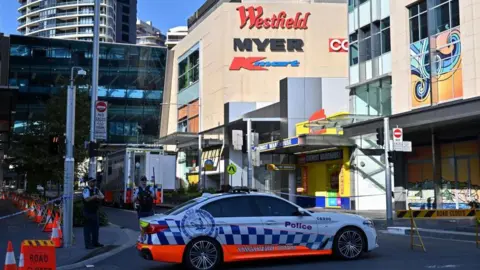 EPA
EPAWithin three minutes, he had fatally attacked five others – Yixuan Cheng, 27; Jade Young, 47, Ashlee Good, 38; Faraz Tahir, 30; and Pikria Darchia, 55. Cauchi also injured 10 others including Good’s infant daughter.
At 15:38, five minutes after his rampage started, Cauchi was shot dead by police officer Amy Scott, who had been on duty nearby and arrived at the centre about a minute earlier.
As news outlets reported on the killings, Cauchi’s parents recognised their son on TV and called the police to alert them about his decades-long struggle with serious mental health problems.
Jade Young’s family was also confronted by images of her on TV, describing to the inquest the horror of seeing video which showed her “lifeless body being worked on”. Similarly, Julie Singleton, whose daughter Dawn was killed while standing in a line at a bakery, heard her daughter named as a victim on the radio before her body had even been formally identified and other relatives informed.
The scenes at Bondi sent shockwaves across the nation, where mass murder is rare, and prompted a rush of anger and fear from women in particular. All except two of the 16 victims were female, including five of the six people who died.
Missed opportunities for intervention
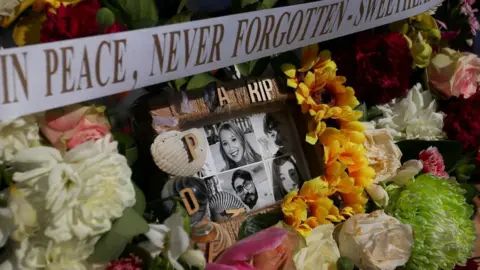 Getty Images
Getty ImagesA key focus of the inquest was to scrutinise the multiple interactions Cauchi had with police and mental health professionals in the months and years leading up to the attacks.
The inquest heard that Cauchi was once a bright young man with a promising life ahead of him. His family say he was a gifted student, and had attended a private school on scholarship before topping his class at university.
At the age of 17, in 2001, Cauchi was diagnosed with schizophrenia and soon started taking medication for his condition.
After a decade of managing it in the public health system, Cauchi started regular sessions with psychiatrist Dr Andrea Boros-Lavack in his hometown of Toowoomba in 2012.
In 2015 he complained about the medication side effects, so Dr Boros-Lavack started to gradually reduce his dosage of clozapine – used for treatment-resistant schizophrenia – after seeking a second opinion from another psychiatrist, the inquest heard.
She weaned him off clozapine entirely in 2018 and Cauchi also stopped taking medication to treat his obsessive-compulsive disorder the year after, she said.
In 2019, for the first time in about 15 years, Cauchi was no longer on antipsychotic medications. No second opinion on completely stopping either drug was sought by Dr Boros-Lavack, she admitted under questioning.
The inquest heard from medical professionals who said that in most cases, patients coming off antipsychotic medications transition to another one, rather than ceasing treatment altogether.
Within months, Cauchi’s mum contacted his psychiatrist with concerns about her son’s mental state after finding notes showing he believed he was “under satanic control”. Around the same time, Cauchi developed what Dr Boros-Lavack told the inquest was “a compulsive interest in porn”. She wrote a prescription but told the inquest it was up to Cauchi to decide if he would start taking the medication again.
In 2020, Cauchi left his family home, moved to Brisbane and stopped seeing Dr Boros-Lavack.
At this time, after almost two decades of treatment, Cauchi had no regular psychiatrist, was not on any medications to treat his schizophrenia and had no family living nearby.
The inquest heard he began seeking a gun licence, contacting three Brisbane doctors for a medical certificate to support his application. They either didn’t request access to his medical file or weren’t given his whole history by Dr Boros-Lavack, who said if they needed more information they could have asked her for it. The third doctor gave Cauchi the clearance he was after, but he never applied for a gun, the court was told.
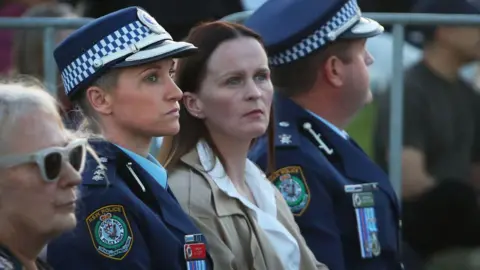 Getty Images
Getty ImagesMeanwhile Cauchi was increasingly coming into contact with police. After moving to Brisbane, he was pulled over three times for driving erratically. In 2021, officers were called to Cauchi’s unit in Brisbane after residents heard a man screaming and banging sounds.
In 2022, Cauchi was reported to police after calling a girl’s school to ask if he could come and watch the students swim and play sports. Officers tried to call Cauchi but weren’t able to reach him.
In January 2023, Cauchi had moved back in with his parents in Toowoomba and called police to complain that his father had stolen his collection of “pigging knives”. At this time, his mother raised concerns with the officers, saying he should be back on medication.
Authorities can’t detain people for mental health reasons unless they are a risk to themselves and as the officers had assessed Cauchi did not meet that description, they left, the court heard.
After the call-out, one of the attending police officers sent an email to an internal police mental health coordinator, requesting they follow up on Cauchi. However, the email was overlooked due to understaffing, the inquest was told.
Months later, police in Sydney found Cauchi sleeping rough near a road after being called by a concerned passerby.
By 2024 Cauchi’s mental health had deteriorated, he was homeless, and isolated from his family.
Three minutes that changed everything
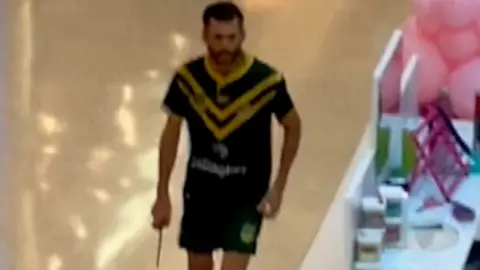 Rohan Anderson
Rohan AndersonThe inquest looked closely at Cauchi’s mental health treatment in Queensland, with a panel of five psychiatrists tasked with reviewing it.
They found that Dr Boros-Lavack had missed opportunities to put him back on anti-psychotic medication, one member of the panel saying she had “not taken seriously enough” the concerns from Cauchi’s mother in late-2019.
The panel also gave evidence at the inquest that Cauchi was “floridly psychotic” – in the active part of a psychotic episode – when he walked into the shopping centre.
When questioned by the lawyer assisting the coroner, Dr Boros-Lavack stressed: “I did not fail in my care of Joel.”
She had earlier told the inquest she believed Cauchi was not psychotic during the attack and that medication would not have prevented the tragedy.
Dr Boros-Lavack said the attacks may have been “due to his sexual frustration, pornography and hatred towards women”.
But the next day, she withdrew that evidence, saying it was simply “conjecture” and she was not in a position to assess Cauchi’s mental state, having not treated him since 2019.
However the inquest is investigating whether Cauchi targeted specific individuals or groups.
For Peter Young, the brother of Jade, the answer seemed clear. “Fuelled by his frustration with not finding a ‘nice’ girl to marry”, his “rapid hunt found 16 victims, 14 of which were women,” he told the inquest.
The NSW Police Commissioner in the days after the attack said it was “obvious” to detectives that the offender had focussed on women.
However, during the inquest, the homicide squad’s Andrew Paul Marks said he did not believe there was evidence that Cauchi had specifically targeted women.
The inquiry also heard about a number of failings or near misses in the way security, police, paramedics and the media responded to the attack.
It was told that recruitment and training pressures for the security provider meant that the centre’s control room operator was not “competent”. At the exact moment when Cauchi stabbed his first victim, the room was unattended as she was on a toilet break.
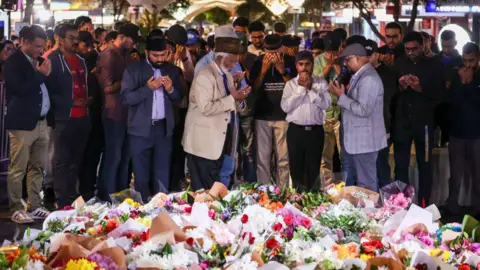 Getty Images
Getty ImagesSecurity guard Faraz Tahir, the sole male victim of the stabbings, was working his first day on the job when he was killing trying to stop Cauchi, raising questions over the powers and protection given to personnel like him.
His brother, Muzafar, told the inquest how Faraz died “with honour as a hero” and also acknowledged that Cauchi’s parents had lost their son: “We know that this tragedy is not their fault.”
The contractor responsible for security at the shopping centre has since updated its training and policies, as well as introducing stab-proof vests for guards.
Several families criticised media coverage in the wake of the attack, telling the inquiry they hoped the industry would reflect on how they should report sensitive stories so as not to further traumatise those affected.
Lessons to be learnt
After weeks of evidence, the inquest was adjourned on Thursday with NSW state coroner Teresa O’Sullivan expected to deliver her recommendations by the end of the year.
At the start of the inquest, O’Sullivan said the hearings weren’t about who was to blame for the attacks, but rather to “identify potential opportunities for reform or improvement to enable such events to be avoided in the future”.
“I want the families to know their loved ones will not be lost in this process.”
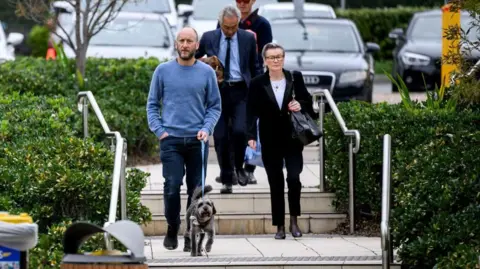 EPA
EPAElizabeth Young, though, told the court, for her, “nothing good” will come from the inquest.
“At 74, I have lost my way in life,” she said, describing the crippling impact of the killings.
But she said the action the country needed to take was already obvious to her.
“My daughter was murdered by an unmedicated, chronic schizophrenic… who had in his possession knives designed for killing.
“[This is] another cry out to an Australia that doesn’t seem to want to acknowledge that what happened… is essentially the catastrophic consequence of years of neglect of, and within, our mental health systems.”
Source link

